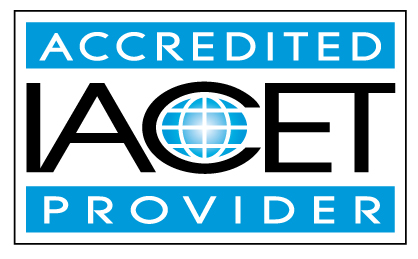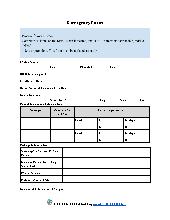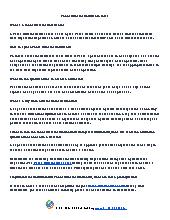Texas Primary Caregiver Qualification - $97
Level
In the state of Texas, one of the accepted forms of education for becoming a primary caregiver of a licensed child-care home is 72 hours of Child Development training and 30 hours of Management training. This course fulfills that educational requirement and will provide caregivers with essential skills in supporting the growth and development of young children. Become a highly qualified family child care provider with ChildCareEd's Texas Primary Caregiver Qualification, supporting home daycare providers everyday!
*This course is only approved in the state of Texas*
This course covers the following topic areas:
- Child Growth and Development 14 hours
- Responsive Interactions and Guidance 7 hours
- Supporting Skill Development 19 hours
- Health, Safety, and Nutrition 19 hours
- Learning Environments, Planning Framework, Curriculum, and Standards 15 hours
- Family and Community Relationships 5 hours
- Professionalism and Ethics 5 hours
- Business and Operations Management 6 hours
- Human Resource Leadership and Development 12 hours
By the end of this training, the learner will be able to:
- Identify different types of risk management common in child care.
- Explain the importance of using contracts and employee training & screening procedures.
- Define print knowledge as it relates to a preschool classroom.
- Describe the importance of monitoring the family child care environment for potential risks.
- Identify resources addressing health, safety and nutrition topics (CPR, 911, CDC, WIC, Poison Control)
- Demonstrate knowledge of appropriate child abuse reporting process
- Understand the relation between how material and equipment selection assist with lesson plan development and implementation.
- Define and identify the components of developmentally appropriate practice
- Identify the role of play in the early childhood environment.
- Give examples of ways to apply and model ethical behavior and professional integrity with all children and youth.
- Give examples of ways to apply and model ethical behavior and professional integrity with community members and organizations.
- Give examples of ways to apply and model ethical behavior and professional integrity with families.
- Define differentiated instruction in early childhood education and describe how it may look in the classroom.
- Identify and contemplate bias and explore anti-bias approaches that support working with children and families.
- Identify strategies to prevent Adverse Childhood Experiences
- Demonstrate an understanding of brain development in young children.
- Demonstrate understanding of brain development in young children.
- Identify appropriate practices for teacher- and child-directed activities.
- Explain typical and atypical development.
- List examples ways to incorporate inclusion and equity in the classroom
- Identify staff evaluation tools and evaluation timelines that will assist with staff supervision and monitoring performance
- Demonstrate an understanding of development in children 3-5 years of age and their learning styles.
- Demonstrate an understanding of how play promotes development.
- Identify tips and strategies for successful mixed-age group instruction.
- Describe developmental domains
- Identify the difference between teacher-/child-directed activities.
- Identify a variety of marketing platforms to promote childcare programs.
- Demonstrates understanding of community organizations that support early childhood programs.
- Demonstrate understanding of optimal room arrangements for family child care settings and their components.
- Demonstrate how environment and equipment modifications support individual needs for school-age children.
- Demonstrate understanding of the roles and responsibilities of an administrator in a child care program.
- Demonstrate understanding of developmentally appropriate practices for school-age children with various needs.
- Define self-esteem and identify issues and strategies for support of school age children.
- Describe strategies to support school age childrens language and literacy skills.
- Describe strategies to support the development of mathematical skills in school age children.
- Demonstrate understanding of theory of coaching and mentoring.
- Define what it means to be a coach in the early childhood education setting.
- Define what it means to be a mentor.
- Describe nonverbal communication as it relates to coaching and mentoring.
- Explain intercultural communication as it relates to coaching and mentoring.
- Explain the value of self-evaluation and reflection.
- Define SMART goals and describe its historical context.
- Explain different types of modes/ delivery methods of mentoring.
- Describe what is a professional growth plan for coaching and mentoring.
- Demonstrate understanding of how to write effect SMART Goals.
- Explain the benefits of setting goals in a coaching/mentoring program.
- Demonstrate an understanding of using community resources for referrals.
- Identify and use community resources to support learning.
- Describe ways child care professionals can support advocacy issues.
- Demonstrate an understanding of the importance of establishing a business plan.
- Identify the aspects of establishing a family child care business.
- Demonstrate an understanding of the benefits of marketing your family child care business.
- Identify family childcare learning environments and discuss the pros and cons of each room and display
- Demonstrate understanding of an appropriate family childcare curriculum
- Identify guidance and discipline strategies to use with various behavior problems.
- Demonstrate an understanding of the cognitive and language stages of development in children five to twelve years of age
- Demonstrate an understanding of content areas and how they are related to child development.
- Identify the features of effective instruction for print knowledge.
- Identify resources that will assist with record keeping.
- Describe positive discipline strategies to use in the classroom.
- Explain when to report child abuse
- Demonstrate an understanding of how to create a natural outdoor classroom that supports child development in all areas.
- Identify specific considerations and resources for implementing an outdoor classroom program.
- Identify materials and activities to promote learning in the outdoor classroom.
- Define conflict resolution and explain why problem solving is important.
- Define Adverse Childhood Experiences and identify its effects on child development
- Define culture and cultural competency
- Recognizing and preventing shaken baby syndrome
- Define developmental domains.
- Recognize the importance of knowing the stages of development.
- Define Developmentally Appropriate Practice
- Recognize the differences between major theories.
- Describe infant/toddler nutritional needs.
- Describe the benefits of an outdoor classroom.
- List and review tracking systems to monitor the daily feeding schedule of infants and toddlers
- Describe the steps teachers should take to identifying challenging behaviors.
- Explain appropriate crib guidelines for caregivers to ensure safe sleep for infants and young toddlers.
- Identify ways to interact respectfully and appropriately in a variety of cultural contexts
- Explain how theory is reflective in the child care environment.
- Identify ways to examine child behavior to prepare for guidance.
- Identify theorists of guidance and discipline
- Explain the possible causes and results of traumatic brain injury in infants and young children.
- Define and identify common signs and behaviors of children and youth with depression.
- Demonstrate understanding of inclusionary practices for depression in the childcare setting.
- Identify Jean Piaget's stages of cognitive development.
- Identify theory and theorist in relation to child development.
- Define and identify common signs and behaviors of children and youth with developmental disabilities.
- Define and identify common signs and behaviors of children and youth with ADHD.
- Demonstrate understanding of inclusionary practices for ADHD in the child care setting.
- Demonstrate understanding of inclusionary practices for developmental disabilities in the childcare setting.
- Identify similarities between major theories.
- Demonstrate an understanding of prenatal development and its impact on child development.
- Demonstrate understanding of inclusionary practices for autism spectrum disorder in the child care setting.
- Demonstrate how theory is reflective in the child care environment for infants and toddlers.
- Describe the importance of social emotional skill development in children entering kindergarten.
- Define and identify common signs and behaviors of children and youth with conduct disorder.
- Demonstrate understanding of inclusionary practices for conduct disorder in the child care setting.
- Identify strategies to increase scientific inquiry in the infant and toddler classroom
- Demonstrate an understanding of cognitive development as it relates to science in infants and toddlers.
- Demonstrate an understanding of typical and atypical development from birth to age 2..
- Identify the stages and milestones of development from birth to age 2.
- Demonstrate an understanding of brain development in children birth through age three.
- Identify the need to maintain individual feeding schedules for infants.
- Define project based learning and the implications of practice.
- Identify resources for referral and specialized services.
- Describe the stages of emotional development in young children.
- Demonstrate an understanding of how chronic illness can affect development in ages four and above.
- Demonstrate understanding of how to assess and meet the needs of children with special needs.
- Demonstrate an understanding of the impact of culture and diversity in relation to school readiness.
- Understand the relation between how material and equipment selection assist with lesson plan development and implementation.
- Demonstrate an understanding of typical and atypical development from age 2 to 5.
- Identify strategies to promote play in the early childhood learning environment.
- Define self-esteem and identify how it relates to art.
- Demonstrate Understanding of Meal Planning for young children.
- Demonstrate an understanding of individual planning.
- Demonstrate an understanding of how to develop appropriate daily schedules that promote routines. (1 hr)
- Identify different types of barriers for mixed ages with disabilities and ways to adapt curriculum to fit their needs.
- Demonstrate understanding of appropriate interaction with infants and toddlers.
- Demonstrate an understanding of appropriate supervision for all children’s activities.
- Demonstrate understanding of positive alternatives of timeouts and certain disciplining techniques based on best practices.
- Demonstrate an understanding of approaches to learning
- Demonstrate how to develop policies and procedures that promote good hygiene
- Define the meaning of professionalism in child care.
- Give examples of ways to apply and model ethical behavior and professional integrity with staff and administrators.
- Identify strategies to make connections and interact substantively with those who are different from oneself
- Demonstrate how theory is reflective in the child care environment.
- Identify strategies to listen while withholding judgement about the new or unfamiliar
- Identify the components of the MY Plate.
- Demonstrate knowledge of appropriate reporting process.
- Define basic skills children should have when they begin kindergarten
- Identify effective strategies for interviewing potential new staff.
- Identify factors that may influence learning for a child in the family child care environment.
- Demonstrate understanding of children's general knowledge that supports emerging math skills
- Give examples of strategies to prevent traumatic brain injuries in infants and young children.
- Identify the signs of child abuse and neglect.
- Identify the components of a lesson plan for the family child care setting
- Identify different learning styles and how to differentiate instruction to meet a child's needs.
- Demonstrate an understanding on how chronic illness can affect development in ages birth to three.
- Identify stages and milestones of physical and cognitive development ages 6-13.
- Demonstrate an understanding of physical growth and development in school age children and the impact it has on programming.
- Demonstrate an understanding of how promoting an integrated curriculum promotes development.
- Define the Cycle of Inquiry and how it can be used to plan emergent curriculum.
- Identify the importance of math instruction with young children.
- Demonstrate an understanding of concepts within the activity and content area for language/literacy
- Define and identify common signs and behaviors of children and youth with Autism Spectrum Disorder.
- Identify characteristics of project based learning in the classroom environment and curriculum
- Identify and demonstrate positive guidance techniques that promote social competency and pro-social behavior.
- Identify positive leadership techniques.
- Demonstrate an understanding of developmentally appropriate practices for infants and toddlers with developmental, emotional, cognitive, language and/or physical needs.
- Identify different learning styles of young children
- Identify the different learning concepts related to block play.
- Identify adaptations to materials and equipment for children with diagnosed special needs or delay
- Demonstrate an understanding of how to be open to new perspectives and diverse others.
- Explain various methods of providing performance feedback in coaching and mentoring.
- Define the role of a Coach for child care providers
- Distinguish between coaching and mentoring.
- Describe techniques used in successful coaching and mentoring.
- Describe the importance and value of coaching and mentoring.
- Identify necessary information and format for a business plan
- Demonstrate an understanding of the overall cost of child care
- Identify stages and milestones of development for ages 1 to 5
- Demonstrate an understanding of ethical conduct: Statement of Commitment & Preamble
- Define the term multiculturalism and how it relates to the child's environment.
- Demonstrate an understanding of the necessary content of employee and parent contracts
- Identify the nutritional needs of children aged four and above.
- Demonstrate an understanding of how available materials and equipment guide activity development
- Distinguish appropriate indoor safety concerns
- Distinguish appropriate outdoor safety concerns
- Define social emotional development in young children
- Demonstrate an understanding of diverse perspectives, and navigate the ambiguity and complexity that comes with that.
- Describe the importance of responding sensitively to differences in individual communication styles.
- Demonstrate communication skills that enable intercultural communication, including effective listening skills
- Identify the recommended feeding patterns of school-age children.
- Identify the importance of professional development for child care professionals and strategies to make meaningful choices.
- Describe the meaning of positive discipline in the classroom.
- Demonstrate an understanding of the importance and components of a mission statement.
- Define active play in the early childhood classroom and describe its benefits for young children.
- Select activities to focus on play, exploration, and constructive approaches to learning math.
- Describe Piaget’s sensorimotor and preoperational stages of cognitive development.
- Explain the challenges behind mixed-age group instruction and strategies to overcome them.
- Identify budget line items and basic budget development strategies
- Criteria to earn CEUs:
- Certificates are awarded when the following criteria have been met by the learner:
- Class has been paid in full
- All material has been reviewed
- All review questions and final test have been completed with a passing score of 80% or higher.
- Learning Assessment Method:
- Learners will be assessed through questions after every section is completed. Learners will not be
allowed to proceed to the next section of the training until all questions have been answered correctly.
Learners will be presented with a final test composed of true/false and multiple choice questions.
Upon successful completion of the training, learners will receive their certificate by email.
- Learning Methodology:
- Online material will be presented in the form of slides,
accompanied with speech. Videos will be used to demonstrate ideas and concepts. Charts and tables
will be used for illustration.
- Logistics/Required Technology:
- A stable internet connection is required for the completion of this course. Users are highly encouraged to take their online course on Google Chrome on either a laptop or desktop computer. Speakers and/or headphones are also required to hear speech.
- Payment Policy:
- Payments need to be made in full. No refunds will be issued after starting the class.
- Proprietary or conflict of interest disclosure:
- Unless otherwise stated in the course description none of H & H subject matter experts and editor has any conflict or proprietary interests related to the material they prepared in this course.
- Support Services:
- Please visit our contact us page
You are purchasing a session of an online training that includes online assessments. Your certificate will be emailed to you once you pass the final exam with a passing grade of 80%.
Your certificate will bear the name you provided to us when you signed up. For support and questions regarding the material presented in this class please contact us at [email protected]. Please consult our frequently asked questions page for other questions or feel free to contact us.
No prerequisites are required for the completion of this course.
Hours breakdown
72 CD/ 30 PROTopics / Categories
ProfessionalismChild development
Group Admin
Basic
Latest Jobs
- Requirements to Become a Primary Caregiver in Texas Child-Care Homes
- Lead Caregiver Qualifications and Responsibilities in Michigan Childcare Facilities
- Instructor-Led Training: Texas
- Texas Rising Star
- Texas Director Credential
- How to earn your CDA: Texas providers
- Launching Your Leadership Journey: Child Care Director in Texas
- Texas 24 Hour Pre-Service Training for Child-Care Workers
- Why Every Caregiver Needs Adult, Child, and Infant CPR Training
- Child Care Licensing in Texas: What You Need to Know to Stay Compliant
- Child care careers in Texas
- Discounted Texas requirements
- Family Child Care, Texas Style
- Need Annual Training Hours Texas?
- Don’t Snooze on SIDS: Safe Sleep Tips for Infants That Every Caregiver Should Know
- Achieve Your Career Goals with the Texas Director Credential Course
- Texas providers looking for child development classes online?
- Certificación CDA en Texas
- Texas annual training
- FREE 24 Hour Texas Pre-Service Training Giveaway









